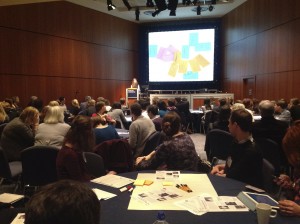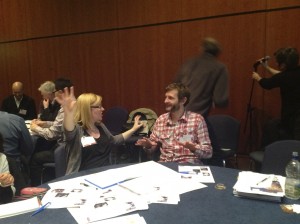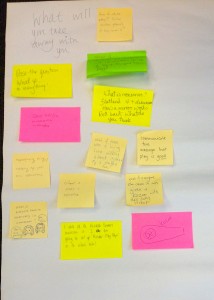Manchester’s Playful Museum at the MA Conference
At the MA conference this year we led a workshop about Manchester Museum’s Playful Museum project. We wanted to demonstrate how we have begun to put the Happy Museum principles into practice using playful, participatory activities and asking colleagues to adopt our ?What if??’ approach.
Our project aims to enhance the well-being and happiness of children and families who visit, through supporting more opportunities for children’s play. Through the Playful Museum project we have looked at how staff can learn from innovative work the play work sector and embed new, creative ways of working which can support playful opportunities for children. The project has involved play worker specialists providing support, guidance and on-site training with Manchester Museum staff, initiating a cultural shift to encourage children to feel even more able to play freely within the Museum’s galleries. The shift has begun to happen with staff developing a deeper understanding of play and the play process in order to better support it across all the Museums visitor-based activity, with an ultimate aim to create and implement a play policy for the Museum.
In our workshop we started with a group activity to help introduce our project and the concept of play. We provided some ?What if??’ scenarios- What if you had noses and the end of your arms? What if you only had 2 fingers? What if your nose was where your bottom is? Everyone discussed their ?What ifs’ in groups of 2 or 3- resulting in some very animated deliberations and some very funny photos!
The point of this exercise was to try and encapsulate, in a brief moment, the essential qualities of play ? children’s ways of seeing what more bodies, affects, materials and so on can do- a creative and imaginative way of looking at things that reveals a differently ordered world is possible. Through playfully problematising the given order of things, children create uncertainty, in order to regain balance. Such moments of playing simply make life a little better.
From there we went on to share some of our stories about the project- what’s going well and what isn’t, telling stories about the playful prompts we’ve set up and sharing the small moments of undirected play that we’ve spotted happening on the galleries in terms of both visitors and staff. We then asked participants to discuss how children play in their museums. We had the chance to hear feedback for the groups and it was really encouraging to hear there is a lot of playfulness happening in other museums too!
After our storytelling and the group discussions we needed another activity to energise the group again. In pairs everyone had to count 1,2,3 in sequence and then we switched it so 1 was replaced with tapping your head, 2 was clapping your hands and 3, stamping your feet. There was lots of hilarity and I’ve been told we could be heard through the wall by the session next door- whoops!
To end with, we asked everyone to discuss in their groups what they would do to make an immediate difference to playfulness in their museum. Some amazing ideas came through and it was fantastic to hear how enthusiastic everyone was. A little bit of playfulness went a long way at the end of the first day at the MA conference this year!




